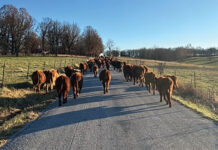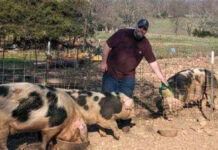
In these uncertain economic times, William Stanton believes, “It hasn’t affected the goat market; neither in the breeding stock nor commercially.”
William and wife, Debbie, are breeding and raising show goats and breeding stock on their farm just out of Marshfield, Mo., in Webster County. William recently placed a bid on a nearby farm with more acreage.
Boer is the only breed of goat to be found at the Stantons. William likes them because, “They’re unique. They’re altogether different than any other kind of goat. They’re easy to handle, don’t get out, and they don’t climb fences. They’re real docile.”
William said Boers are “actually bred for meat, but mine aren’t. Mine are for breeding stock and for showing.” This is William’s third season of showing and breeding goats. "My first year out, I had a doe that was Grand Champion five times.” Unfortunately, he lost her “just before she started kidding.”
William shows many of his goats and this year he plans to “go on to the national show if I have something good enough. I’ve never been.” He is referring to the ABGA (American Boer Goat Association) National, and said it will be held in Monroe, La., this year.
William has “about 40 goats.” But that can change rapidly. He said, “Boer goats are very fertile and are more apt to have twins or triplets than they are to have singles. I’ve had one single this year and three sets of triplets.”
Birthing problems “depend on the doe. I’ve got does that never have any problems, and I’ve got two or three that I need to be there. Sometimes you have to pull the babies.”
The biggest problem William has found with the goats is worms. "I try to worm them every 60 days.” He also vaccinates his goats. He said, “You self-feed these babies till they get about six months old. So you need to give them a shot for tetanus, plus there’s another shot for over-eating. They will over-eat and founder just like a horse.” He added, “It’s not a good idea to change feed unless you do it gradually, because they’re pretty sensitive when you switch feed on them.”
The goats are also weather sensitive. William said, “These Boer goats require a shed. Snow doesn’t bother them, but they don’t like rain. They’ll hit the shed as soon as it starts raining.”
The goats have their feet trimmed “around four times a year.” But in a few short weeks, William’s goats will get their Spring make-over. “The older does and bucks usually put on pretty heavy coats. I have some young does that don’t have much of a winter coat. It depends on how you house them. I usually clip them around May and get the winter coat off so they have a nice coat for show.” He explained that clipping isn’t necessary, “but if you’re going to show them, it’s best to clip them around May.” He leaves about a half inch of hair on the goats.
One other animal you will find on the Stanton farm is their guard dog. They have not lost any goats to wild animals and William gives the credit to the dog. “He does an excellent job. You can use a llama or a donkey, but I prefer the dog.” His dog has never stayed at the house. William said, “He thinks he’s a goat, and he’ll protect them.”
William Stanton has Boer goats of all ages, and sells them ranging from six months to two years old to individuals for show and for breeding stock.







